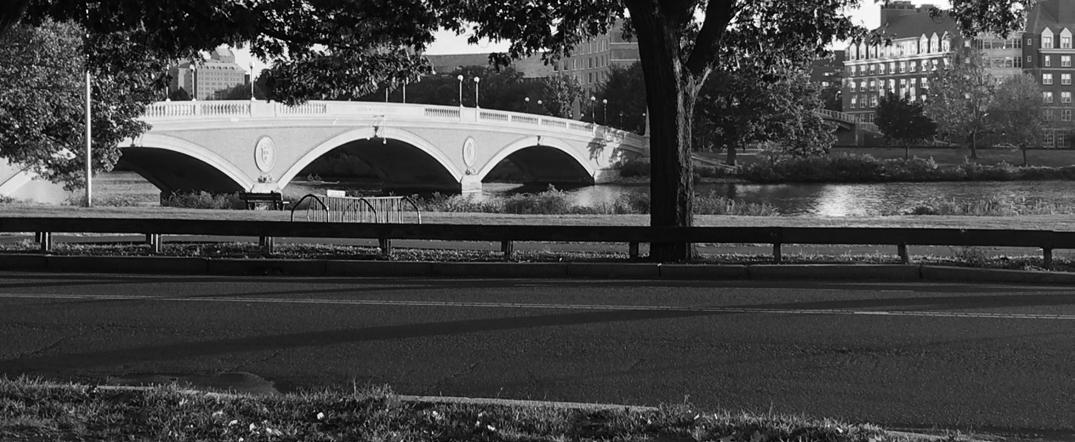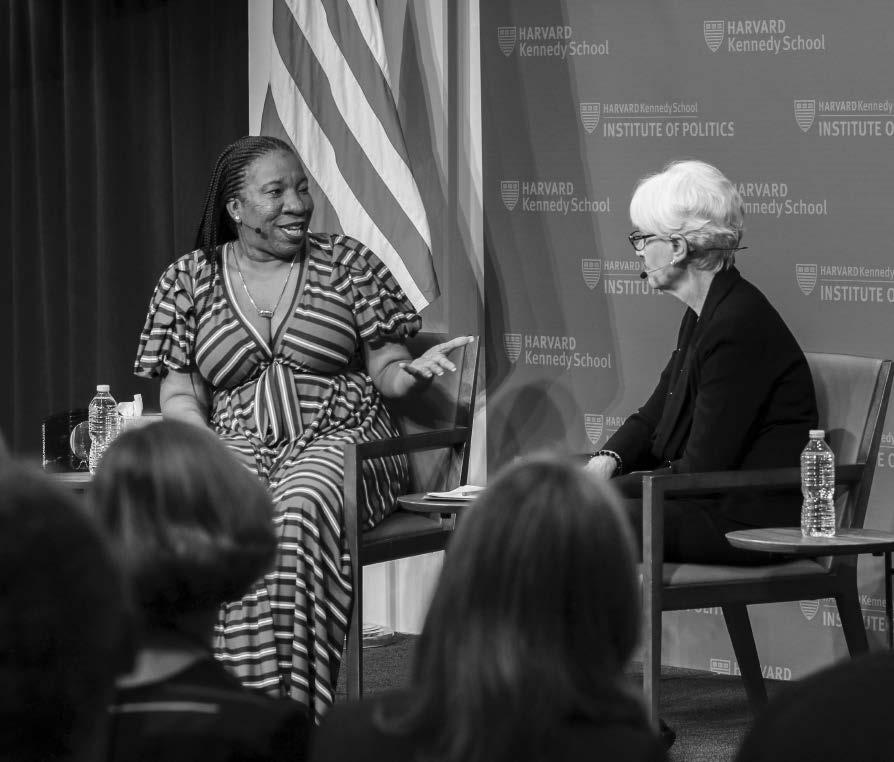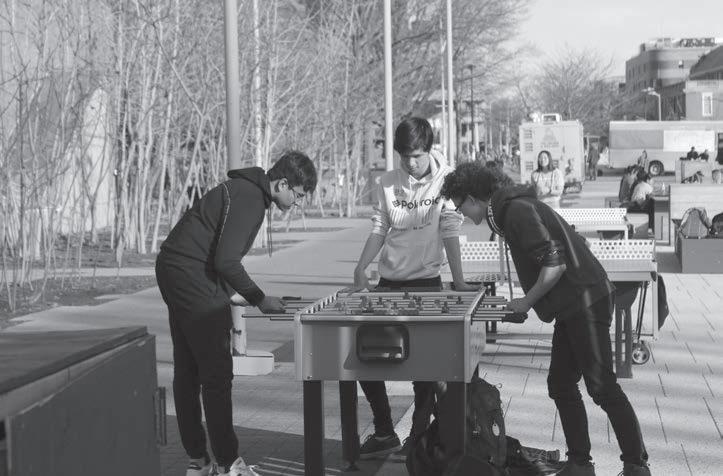Page 3
THE HARVARD CRIMSON | February 27, 2020
#MeToo Founder Tarana Burke Reflects on Work By sixiao yu and Raquel C. Uribe Crimson Staff Writers
At the Institute of Politics Wednesday, Tarana Burke, the founder of the #MeToo movement, discussed the importance of intersectionality in her work and how she thinks the movement should continue after recent verdicts against Hollywood executive Harvey Weinstein. At the beginning of the event, Burke received a standing ovation after being awarded the Harvard Kennedy School’s Alan Gleitsman Citizen Activist Award. Ambassador Wendy R. Sherman, Kennedy School professor and director of the Center for Public Leadership, moderated both the conversation with Burke and a discussion with audience members. During the discussion, Burke reflected on Weinstein, whose alleged sexual misconduct fueled the #MeToo movement in 2017. On Monday, a jury charged Weinstein — a movie executive whom more than 100 women have accused of sexual harassment and abuse — with a criminal sexual act in the first degree and third degree rape. He was acquitted of first degree rape and two counts of predatory sexual assault. “There’s a lot of excitement in the air right now — some renewed energy after this Wein-
stein verdict, which I’m going to comment on, because we have a lot of work to do,” Burke said after receiving the award. “But I am really grateful for where we are.” Burke founded the #MeToo movement in 2006, while working at Just Be Inc., her nonprofit that focuses on supporting young women of color. She coined the phrase “me too” as a statement supporting people who have experienced sexual assault. In 2017, the New York Times broke a story documenting decades of allegations of sexual harassment against Weinstein. Soon after the story was published, actress Alyssa J. Milano began using the #MeToo hashtag. Hundreds of people began sharing their own stories of sexual misconduct using the hashtag. That fall, Burke’s movement — over a decade old — suddenly emerged in the spotlight. At the discussion, Burke acknowledged that the Weinstein verdict “is not an indictment of #MeToo.” She said the movement “is about catharsis” and “healing.” “Justice looks different for everyone and survivors don’t think punitively,” Burke said. “We want healing.” Burke also discussed differences between society’s response to women of color and white women who experience sexual assault.
“Whether — white men, black men, black women — we have been socialized to respond to the vulnerability of white women,” Burke said. “And because of that, we put aside so many things, and we push forward.” In the question portion of the forum, Lovern J. Gordon — founder of Love Life Now, a nonprofit to support people who have experienced domestic abuse — asked how to bring more people, including those from underrepresented backgrounds, into the #MeToo movement. Burke stressed that providing resources to marginalized groups who may have felt disconnected from the mainstream #MeToo movement. “Our work, our programs — and we’ve taken two years to really work hard to build out programs specifically so that we are hitting marginalized groups first, and so that we get to the people who usually don’t get the resources first,” Burke said. Burke also encouraged students to get involved in procuring more resources at higher education institutions such as Harvard for people who faced sexual misconduct. “When places like Harvard have courage they maybe haven’t had in the past, others follow,” Burke said. “You have the power now. You have the power in your pocketbook because you are paying tuition. Sit down and
Tarana Burke, founder of the #MeToo movement, speaks on Wednesday at the Institute of Politics. Ryan n. gajarawala—Crimson photographer
examine what forms of power you have, and use that power to push back.” Maria Keselj ’23 said in an interview after the forum that it was “really insightful” to lis-
HKS Dean Supports Student Activists By Sixiao yu Crimson Staff Writer
Amid continued criticism over the lack of faculty and student diversity at the school, Harvard Kennedy School of Government Dean Douglas W. Elmendorf said he hopes to engage with student activism in an interview Wednesday. “Our students are passionate about making the world better. That’s why we admit them to the Kennedy School — it’s because of that passion,” he said. “Universities tend to move more slowly than students want them to move, and I remember that very clearly from when I was a graduate student here at Harvard.” Elmendorf stressed the role free speech plays in HKS’s programming, pointing to the John F. Kennedy, Jr. forum as a space for discussion between audience members and prominent speakers. “Every event at the Kennedy School, with an outside speaker,
there are questions and answers that come from the members of the audience and sometimes the questions are friendlier and sometimes the questions are more critical. “ Kennedy School students and administrators have started their own discussions regarding diversity at the school in recent years. Student groups such as the HKS Equity Coalition have advocated for the school to increase diversity in its student body, faculty, and curriculum. Earlier this month, the coalition sent an email — signed by multiple affinity groups and 375 HKS affiliates — to Elmendorf demanding that the school “commit to creating a culture and environment built on the principles of anti-racism.” The letter called on HKS to implement mandatory diversity training for all HKS affiliates in the spring, host a required course across all degrees on the “history of race and inequality” for the upcoming fall semester,
and hire faculty of color who “critically study the intersectionality of race, gender, class, and power.” In his response, Elmendorf wrote that the Kennedy School will partner with advocacy group Community Change, Inc. to develop anti-racism workshops this spring. He also wrote that while he and his colleagues are “committed” to enhancing a diverse education at HKS, they are not yet convinced that “a required, standalone course is the best approach.” Elmendorf added that the school hired five faculty members over the past three years such as Marcella M. Aslan ’99 and Desmond W. Ang “who work on aspects of ‘difference.’” In the interview, Elmendorf, referencing the letter and his response, spoke about how the school has designed their search for new faculty to “reduce biases” and “cast a very wide net.” “We have been able to hire
outstanding people, because of that,” he added. Elmendorf said that Sandra S. Smith, a current professor of sociology at the University of California, Berkeley, will join the HKS faculty. Smith studies issues of urban poverty and racial inequality. “She is one, now, of half a dozen family members we’ve hired in the last few years, who focus on race and gender identity issues,” Elmendorf said. Elmendorf said the school also hopes to increase the amount of financial aid offered to its students. “We’re fortunate to have a lot of friends at the Kennedy School who provide financial aid who are not alumni of the school, but who believe passionately, like our students, in the importance of public service,” Elmendorf said. “And we hope to continue to increase the amount of financial aid we can offer.” sixiao.yu@thecrimson.com
ten to the “empathy-based, survivor-based” perspective that Burke presented. “We all have this urge to go and get justice,” she said. “But really, when you look back, is
that what people really want? I find that it’s this really aggressive — and you can call it a toxic masculine — way to look at it.” sixiao.yu@thecrimson.com
amicus From Page 1
DOJ Files Pro-SFFA Appeal Brief the emails, depositions, internal studies, data analysis and testimony that SFFA presented to the district court to prove that Harvard’s admissions policies are discriminatory.” The Justice Department’s brief comes as the latest part of litigation that has been pending against Harvard for several years. SFFA initially filed its lawsuit against Harvard in November 2014. Last October, District court Judge Allison D. Burroughs ruled in Harvard’s favor and found that the College does not discriminate against Asian American applicants. Eonomists and several legal organizations also submitted amicus briefs supporting SFFA and opposing the district court ruling. Those groups include Mountain States Legal Foundation, Judicial Watch, and the National Association of Schol-
ars, among others. The Asian American Coalition for Education and the Asian American Legal Foundation also submitted a brief, which lists the names of nearly 300 Asian American organizations as supporters. Harvard spokesperson Rachael Dane declined to comment on the amicus briefs. The brief marks the second time the Justice Department has previously supported SFFA in its lawsuit against Harvard. Separately, the Department led its own investigation into alleged discrimination in Harvard admissions, which was confirmed as ongoing in December 2019. Harvard is scheduled to submit its brief in the case by May 14. benjamin.fu@thecrimson.com dohyun.kim@thecrimson.com
The sights and sounds of Harvard.
The Crimson @crimson_photo




